| | DAY 1: 12 July (Mon) | | | Plenary: Opening Session |
|  | | |  Keynote Session: "Long-term perspectives to build a low carbon Asia-Pacific" Keynote Session: "Long-term perspectives to build a low carbon Asia-Pacific" | | | | Ryokichi Hirono, Professor Emeritus, Seikei University | 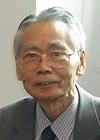 | | HIRONO, Ryokichi: Graduated in 1958 from the University of Chicago in Economics, worked as research assistant at the Institute of Industrial relations, University of California, and as Professor at Seikei University, Tokyo and currently Professor Emeritus, Seikei University and Visiting Professor, National Graduate Institute for Policy Studies, Tokyo. Also, taught at universities in Africa, Asia, Europe, North America and worked at senior management posts at the United Nations, UNDP and other international organizations. Served in Japan on several government advisory councils and board of trustees and directors of a number of research institutes, foundations and civil society organizations. | | | | Said Irandoust, President of Asian Institute of Technology (AIT) | 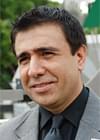 | | Professor Said Irandoust, a Swedish national, currently serves as President of the Asian Institute of Technology (AIT), which is based in Thailand with affiliated Centres in Vietnam and Indonesia. Professor Irandoust was born in 1960 in Tabriz in the province of Azerbaijan in north-west Iran. He moved to Sweden in 1979 as an exchange student. Professor Said Irandoust gained a M.Sc. in Eng. degree in chemical engineering at Chalmers in 1984 and a PhD in 1989 with a thesis on monolith reactors. Prior to joining AIT he was the Vice Chancellor of the University of Boras, Sweden from 2001-2005. Development of strong research environments, internationalization, partnership, with stakeholders and development of a new university concept "The first Swedish University of Professions" were among the key projects during his presidency. Before that he worked with one of Sweden's leading universities Chalmers from 1990 to 2000, with his last position being that of Vice President. As the Vice President at Chalmers, he initiated and supervised a number of development projects within higher learning, further education for professionals, and internationalization. He was Chair of the Swedish Government's Committee for promoting mathematics and member of the Swedish Government's Committee for widening recruitment to universities. He served as a Member of the Board of the National Museums of World Culture, Sweden. He also served as a Member of the Board of Engineers Without Borders and of the Board of the Swedish Foundation for Internationalization of Research and Higher Education (STINT). Professor Irandoust has received the Medal of Progress from the President of the Republic of Azerbaijan. He is also the recipient of an Honorary Doctorate from the Plekhanov Russian Academy of Economics in Moscow. | |
Bindu N. Lohani, Vice-President, Finance and Administration, Asian Development Bank (ADB) |  | Dr. Bindu Lohani is the Vice-President of Finance and Administration of the Asian Development Bank (ADB). Prior to this, he was the Director General of the ADB's Regional and Sustainable Development Department (responsible for sectoral and thematic areas like energy, water, environment and governance) and the ADB's Chief Compliance Officer and Special Advisor to the President on Clean Energy and Environment. He also worked in Infrastructure and Environment Departments at ADB. Before joining the ADB, Dr. Lohani worked at the Government of Nepal. He was also Division Chairman at the Asian Institute of Technology (AIT).
Dr. Lohani holds a Doctorate degree in Engineering. He has completed several management development programs, including programs conducted by the business schools of the University of Chicago, Cornell University, and Corporate Leadership program at Yale University. Dr. Lohani is an elected member of the National Academy of Engineering of United States, and is, a diplomate of the American Academy of Environmental Engineers and Fellow of the American Association for the Advancement of Science Council. | |
Hoesung Lee, Vice-Chair, IPCC | 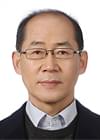 | Hoesung Lee is Vice Chairman of the United Nations Intergovernmental Panel on Climate Change (IPCC) and dean of the college of environment at Keimyung University, Korea. The area of his research and teaching is climate change, energy and environmental economics.
He was elected co-chairman of IPCC Working Group III during 1992-1997. In that capacity he coordinated the development of the IPCC Second Assessment Report on the aspect of economic and social dimensions of climate change which provided scientific basis for the Kyoto Protocol. He served as lead author and review editor for the Third Assessment and the recent Fourth Assessment Reports.
He was the first president of the Korea Energy Economics Institute - a government's energy policy research agency. Dr. Lee served as president of the International Association of Energy Economics - a professional society headquartered in the United States with a mission of advancing energy economics with 3500 members in academics, governments and business over 75 countries. He was senior advisor to the Minister of Energy and Resources and the Minister of Environment. Dr. Lee served on the board of numerous corporations and organizations domestic as well as international, including Hyundai Corporation and IGES. He has published research articles and books on energy economics and climate change policy. | | | | | |  Panel Discussion: "Establishing an Asian-style cooperative system towards a Low-Carbon Asia 2020" Panel Discussion: "Establishing an Asian-style cooperative system towards a Low-Carbon Asia 2020" | | | | Shuzo Nishioka, Senior Research Advisor, IGES | | | | | | Young-Woo Park, Regional Director, UNEP Regional Office for Asia and the Pacific (UNEP ROAP) |  | Dr. Young-Woo Park, a national of the Republic of Korea, joined UNEP as the Regional Director of the Regional Office for Asia and the Pacific in October 2008. Dr. Park brings with him his long and vast experience working in environmental management and international cooperation both with governments and the private sector.
Before joining UNEP's Asia Pacific office, Dr. Park was the President of the Business Institute of Sustainable Development of the Korean Chamber of Commerce and Industry where he actively promoted sustainable development concepts and practices to businesses in South Korea.
He was Director General of International Cooperation in the Ministry of Environment of Korea. During his time there, Dr. Park played an active role in global environmental issues such as climate change and led the Korean delegation during bilateral and multilateral negotiations.
Dr. Park was also a member of a number of environmental committees related to environment including the Presidential Commission on Sustainable Development, the Green Citizens Committee of Seoul City and the Nuclear Power Evaluation Committee. In addition, he headed the Department of Cleaner Production Technology Development and Dissemination at the Korean National Cleaner Production Center and the Industrial Environment Department at Hyundai Institute of Eco-Management.
Dr. Park has PhD in Natural Resource and Environmental Economics from Iowa State University and a Master's Degree in Economics from Southern Illinois University. | |
Nay Htun, Professor, State University of New York, Stony Brook |  | | Nay Htun is currently Research Professor, Department of Technology and Society, Stony Brook, State University of New York. He is a Fellow and Visiting Professor at the Centre for Environmental Policy, Imperial College London; Visiting Professor and Senior Advisor for Asia Pacific, International Institute for Industrial Environmental Economics, Lund University, Sweden; Honorary Professor, Tongyi University, Shanghai, China; Visiting Professor and Advisor, Chulabhorn Research Institute, Bangkok, Thailand. He was Visiting Scholar at Harvard; Visiting Scholar Fletcher School of International Law and Diplomacy, Tufts University; and Chancellor Distinguished Fellow, University of California Irvine. He was formerly with UNEP and UNDP where he had the rank of UN Assistant Secretary General at both organizations. . He was seconded to the UNCED Secretariat, Geneva, Switzerland where he was the Program Director and help organized the 1992 Rio Earth Summit. He was also the focal point for business and industry; help established and liaised with the World Business Council for Sustainable Development. Prior to joining the UN, he was Department Manager with Exxon Thailand. Nay Htun is a Member of the Board of a number of not-for-profit research organizations, including the International Research Institute for Climate and Society, Columbia University, New York; and the Institute for Global Environmental Strategies, Hayama. Japan. He graduated with a Ph.D. in Chemical Engineering from Imperial College London. | |
Monthip Sriratana Tabucanon, Principal Inspector General, Ministry of Natural Resources and Environment, Thailand |  | | Dr. Monthip Sriratana Tabucanon is currently the Principal Inspector General, Ministry of Natural Resources and Environment of Thailand. She previously held key positions at the Ministry as Deputy Permanent Secretary, Director General of the Department of Environmental Quality Promotion, and Director General of the Pollution Control Department, among others. She was leader of several environmental cooperation and capacity building projects in Thailand including her contribution in the field of Gender, Integrated Research and Environmental Dispute Resolution, and in the establishments of the Environmental Research and Training Center which was a Thailand-Japan bilateral project, and of the Asia-Europe Environmental Technology Center which was an Asia-Europe multilateral project. She serves on the Boards of several international organizations including the following - Stockholm Environment Institute (SEI), Sweden ; Institute for Global Environmental Strategies (IGES), Japan ; United Nations Centre for Regional Development (UNCRD), Japan ; United Nations University (UNU) Institute of Water, Environment and Health, Canada; International Council of Women, France ; and former Regional Councilor for South and East Asia of the World Conservation Union (IUCN). She has received international awards including the most recent 2009 Asian Environmental Compliance and Enforcement Award. She has received a Royal Decoration - The First Class of the Royal Order of the Polar Star from King Carl Gustaf (XVI) of Sweden. She obtained her doctorate in Urban Engineering from The University of Tokyo. | |
Yasushi Fukuizumi, Deputy General Manager, Sustainable Energy & Environment Strategic Planning Department, Mitsubishi Heavy Industries, Ltd. | | | In April 2008, new department was organized in MHI headquarter, that pursue federated control of all MHI energy and environmental businesses. (Sustainable Energy & Environmental Strategy Planning Dept.: E&EPD) The presenter participated in the formation of this new organization from the beginning and has been working for the corporate function till now. The presenter has started to work for MHI back in 1982. Since then, he has been in Power Generation Gas Turbine Businesses. In 2006, he was partially entitled as a member of strategy development team in Power System Headquarters and then moved to corporate division in 2008. New department is to access all energy & environmental businesses and try to create new values and to provide the market, while making the recommendation to the Japanese government for the country’s long term energy policy. Most recent topic related with this department is the receipt of pre-feasibility study by Australian company for world first commercial IGCC (Integrated Gasification Combined Cycle) Power Plant with Carbon Capture equipment, which E&EPD coordinate the combination of power systems and chemical engineering technology inside MHI. Besides, E&EPD also received the pre-feasibility study by Japanese Government METI for the development of Smart Community in India. E&EPD will further try to participate in this kind of large international project, while proposing next generation energy infrastructure in Japan. The presenter is currently busy with talking to various people both inside and outside the company and is enjoying the exciting job. Graduated from Tokyo University Faculty of Engineering, Aeronautics in 1982. |
|  | |  | | |  Asia-Pacific Perspectives on Future Climate Regime Asia-Pacific Perspectives on Future Climate Regime | | | | Takejiro Sueyoshi, Special Advisor to UNEP Finance Initiative and the Principles for Responsible Investment in the Asia Pacific Region | | | | | | Fei Teng, Associate Professor, Tsinghua University, China | | | | Rizaldi Boer, Executive Director, Center for Climate Risk and Opportunity Management in Southeast Asia and Pacific, Bogor Agricultural Univeristy, Indonesia | 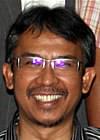 | | | Jusen Asuka, Director, Climate Change Group, IGES | | | | Yuji Mizuno, Director, Market Mechanisms Sub-Group, IGES | | | | | | | | |  Accounting for Co-benefits: Toward stronger climate change, development, and air pollution policies in Asia Accounting for Co-benefits: Toward stronger climate change, development, and air pollution policies in Asia | | | | Charmine Koda, Journalist |  | | Charmine Koda has worked as a newscaster on television and radio, including appearances on NHK television's "Kaigai Weekly" and Fuji Television News "Super Time". In addition to serving as IGES board director, she currently works as a journalist and commentator concentrating on global environmental issues. From April 2006 to June 2008 she served as director of the United Nations Information Centre. | | | | May Ajero, Air Quality Program Manager, Clean Air Initiative for Asian Cities (CAI-Asia) Center | | | | Cornie Huizenga, Joint Convener, Partnership on Sustainable Low Carbon Transport Initiative (SLoCat) | | | | Kotaro Kawamata, Environmental Specialist, Environment and Safeguards Division, Regional and Sustainable Development Department, Asian Development Bank (ADB) | | | | Katsunori Suzuki, Professor, Frontier Science Organization, Kanazawa University | | | | Richard Mills, Convener, Global Atmospheric Pollution Forum | | | | Eric Zusman, Policy Researcher, Climate Change Group, IGES | | | | | | | |  REDD+: Progress, Challenges and Ways Forward: From the local to the global REDD+: Progress, Challenges and Ways Forward: From the local to the global | | | | Zakri Abdul Hamid, Director of the Centre for Global Sustainability Studies at Universiti Sains Malaysia and Science Advisor to the Government of Malaysia | 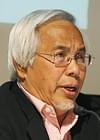 | | Zakri Abdul Hamid: Science Adviser to the Malaysian Government and Director of the Centre for Global Sustainability Studies at Universiti Sains Malaysia, and former Director of the Institute of Advanced Studies at the United Nations University in Tokyo, Japan (2001-2006). Prof. A. H. Zakri co-chaired the “Millennium Ecosystem Assessment” from 2001 to 2005. He is a laureate of a Gold Medal Award from the Rotary Research Foundation (1999) and the Langkawi Award (1998), Fulbright-Hays Fellowship (1981). Prof. Zakri is a member of the Academy of Sciences Malaysia, the Academy of Sciences of the Developing World, the World Academy of Art and Science and the Islamic World Academy of Sciences. | | | | Amanda Bradley, Program Director, Community Forestry Partnership Program, Pact Cambodia |  | Amanda Bradley has been working in Cambodia since 1998 in the natural resources and environment sector. From 1998 to 2004 she worked for the local NGO Mlup Baitong on environmental education, community-based tourism, and environmental radio journalism. From 2005 to early 2009, she worked for Community Forestry International where she managed a number of programs to support community forestry development across the country, including the first REDD (Reduced Emissions from Deforestation and Degradation) project in Cambodia. She currently works for Pact as the Director of the Community Forestry Partnership Program where she continues to guide implementation of community forestry and REDD projects in Cambodia.
She has a Bachelors degree from Amherst College and a Masters Degree from The Fletcher School of Law and Diplomacy at Tufts University in Massachusetts. She speaks Khmer fluently. | |
Lesley McCulloch, Eye on Aceh, Indonesia |  | Educated in the UK, Lesley is currently based in Sumatra, Indonesia. Her main areas of expertise are the political economy of conflicts/ post-conflict environments and in governance issues. She has also, for many years, been working with civil society groups in Aceh to help build research and advocacy expertise in the province.
In recent years, Lesley has found her work focussing more on ‘green governance' and environmental justice. The current focus of her work is with the secretariat of the Aceh Governor's Green Vision secretariat where she is helping to draft the government's ‘principles of good governance for REDD'. She is fluent in Bahasa Indonesia. | |
Gewa Gamoga, Officer, REDD & Climate Change Branch, Forest Policy Planning Directorate, Papua New Guinea |  | Gewa Gamoga is the Officer, Climate Change & REDD with PNG Forest Authority (PNGFA). He holds a Bachelors degree in Forest Management from the PNG University of Technology.
He has been with the organization for almost 19 years. The level of his experience ranges from forest operations to policy and planning. Currently, he assists in maintaining networks with organizations, (key government agencies, NGOs and other stakeholders) involved in developing REDD strategies, climate change research policy development.
He also assists in monitoring the Government PNG’s position on climate change and carbon trading and the development and implementation of REDD initiatives through the Office of Climate Change & Development and maintain the PNGFA data base of current information and knowledge on new initiatives and research in regard to global REDD initiatives. | |
Henry Scheyvens, Director, Natural Resources Management Group, IGES |  | | Henry Scheyvens has been working for the IGES Forest Conservation Project since 2004 now acts as Director of the Natural Resources Management Group. His work has covered a broad range of forest policy and sustainable development issues including REDD-plus, forest policy and law in tropical developing countries, forest certification, community-based forest management, tropical timber trade, microfinance, poverty reduction, and aid evaluation. He holds a PhD in Political Science from Monash University. | | | | | |  Mainstreaming Adaptation: Linking research and actions on the ground Mainstreaming Adaptation: Linking research and actions on the ground | | | | Srinivasan Ancha, Senior Climate Change Specialist, Asian Development Bank(ADB) | 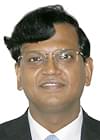 | | Dr. ANCHA SRINIVASAN is a Senior Climate Change Specialist at the Asian Development Bank. He received a Ph.D. from the University of Cambridge, UK and has about 22 years of experience in interdisciplinary research and management including climate change policy. Prior to joining the ADB in 2009, he worked as a Principal Researcher and Manager of the Climate Policy Project at IGES. A Also he worked at the Japan International Research Center for Agricultural Sciences, the Hokkaido National Agricultural Experiment Station and the International Crops Research Institute for the Semi-Arid Tropics. He contributed to many international initiatives such as the Global Environmental Outlook, the Millennium Ecosystem Assessment, and IPCC. He edited 6 books, authored over 80 publications, and presented more than 100 times at international conferences. He received many awards including a gold medal and letter of appreciation from the Prime Minister of India, and Eisaku Sato Memorial Foundation Prize of the United Nations University. | | | | Sreeja Nair, Associate Fellow, Centre for Global Environment Research, Earth Science and Climate Change Division, The Energy and Resources Institute (TERI) |  | | An inter-disciplinary researcher with an M. Sc in Environmental Studies and M.A. in Climate and Society (Columbia University), Sreeja focuses on assessment of vulnerability and adaptation to climate risks and impacts and understanding policy linkages. Her major policy project experiences at the national and state level include the Rajasthan Climate Change Agenda, Climate Risk Screening for mainstreaming adaptation and development for the developmental portfolio of DFID-India, Coastal vulnerability assessment and strategies for better preparedness towards impacts of climate change and sea level rise along the West Bengal coast, National Mission on Sustainable Agriculture for India, IDRC-funded ‘Adaptive policymaking for agriculture and water resources’, Strengthening the Information Sharing System to enhance the capacities of farming communities to cope with climate variability and change’ and contribution to National Action Plan on Climate Change for India. Her research projects include the EU-funded HighNoon- adaptation to changing water resources availability in northern India with Himalayan glacier retreat and changing monsoon pattern, Rockefeller-funded Asian Cities Climate Change Resilience Network, World Bank funded project on ‘addressing vulnerability to climate variability and change through assessment of adaptation issues and options’ and contributions to the United Nations Human Development Report 2007/08. Sreeja worked with the International Research Institute for Climate Prediction and Research, Earth Institute from 2008-2009 on “Understanding El Nino TeleConnections in Africa, Latin America and Caribbean, and Asia Pacific” and “Impacts of climate variability and change in Ceara, Brazil- Understanding the institutional mechanisms and linkages between the science and policy domains”. | |
Md. Rabi Uzzaman, Bangladesh Centre for Advanced Studies (BCAS) | 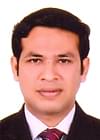 | | I obtained BSc (Hons) and MSc in the Department of Geography and Environment from University of Rajshahi. I have joined Environment and Climate Change division of Bangladesh Centre for Advanced Studies (BCAS). Since then, I have been closely working on climate change adaptation and disaster risk management programmes. My expertise focuses on conduct individual research related to climate change impacts and disaster management in the national and regional context, policy and strategy formulation, community based adaptation research etc. I am also involved in providing training on climate change, vulnerability, impacts and links between climate change and disasters issues. I am one of the co-authors of Human Development Report 2007. Presently I am working for Climate Action Network South Asia (CANSA). | |
Kazuya Yasuhara, Professor Emeritus, Ibaraki University | 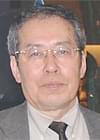 | | Dr. Kazuya Yasuhara is currently an Emeritus Professor of Ibaraki University, Japan. He graduated from Kyushu University in 1968 and earned his PhD from that University in 1978. His major field is Geotechnical Engineering, Civil Engineering. He has served as the leader of sub-project-research on the Influence of Climate Change on Coastal Infrastructure, which is included as a research subject under “Comprehensive assessment of climate change impacts to determine the danger level of global warming and to determine appropriate stabilization targets of atmospheric GHG concentration” (S-4, FY2005-FY2009) of Japan's Ministry of the Environment. Successive to this project, he has undertaken the important role of leader of a sub-project designated as “Exploration of indices for vulnerability and serviceability of adaptation measures in Asian-Pacific regions” whose main subject is “Comprehensive research on global warming influence estimation and adaptation policies (S-8, FY2010-FY2014)” | |
Eklabya Sharma, Programme Manager, Environmental Change and Ecosystem Services, International Centre for Integrated Mountain Development(ICIMOD) | 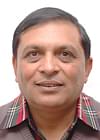 | He has expertise on mountain ecosystem studies and management; participatory natural resource management; biodiversity conservation including ecotourism; transboundary biodiversity landscape development; mountain farming systems specializing on agroforestry; watershed management including land-use/cover change, hydro-ecological linkages and carbon dynamics; and climate change impact and vulnerability assessments and adaptations.
To his credit, he has more than 130 publications. He was the Chief Editor of the Journal of Hill Research for the period 1992 to 1996. Since 2002, he is a Regional Editor for Asia of Mountain Research and Development journal. He has supervised seven Ph.D. theses on ecology mostly dealing with natural resource management of the Eastern Himalayas. | |
Mahesh Pradhan, United Nations Environment Programme, The Regional Office for Asia Pacific (UNEP/ROAP) | 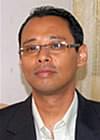 | With over 16 years of service to UNEP, Mr. Mahesh Pradhan provides support to the Environmental Governance team at ROAP with focus on sub-regional partnerships and the annual Asia Pacific Sub-Regional Environmental Policy Dialogue (SEPD). He leads the environmental education nexus, particularly through the ongoing partnership at the UNEP-Tongji Institute of Environment for Sustainable Development (IESD) in Shanghai, and coordinates specific partnerships, such as the Asia Europe Environment Forum (ASEF).
In March 2009, he was assigned as Interim Director of the joint AIT/UNEP Regional Resource Centre for Asia and the Pacific (RRC.AP). The Centre focuses on four support functions: Regional Support, Network Support, Knowledge Support and Institutional Support. Key activities at RRC.AP include a strong focus on atmospheric issues, such as the Atmospheric Brown Cloud (ABC), the East Asia Acid Deposition Monitoring Network (EANET), the Male Declaration on Control and Prevention of Air Pollution and its Likely Transboundary Effects for South Asia, the Regional Knowledge Platform on Climate Change Adaptation for South and Southeast Asia, amongst others. RRC.AP currently has close to 40 staffs, and celebrated its 20th anniversary in September 2009. | |
Daisuke Sano, Deputy Director, Natural Resource Management Group, IGES | 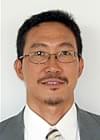 | | Dr. Daisuke Sano joined the Institute for Global Environmental Strategies (IGES) as policy researcher in 2005 and currently serves the Natural Resources Management Group as Deputy Director, focusing on climate change adaptation research. He is an agricultural economist and had been working on topics such as commodity trade issues under NAFTA, economic analysis of water treatment in the Everglades, and environmental impacts of economic integration on the agriculture sector in Asia with a special focus on organic agriculture. Currently he is engaged in research on biofuel utilization for sustainable development and adaptation in the agriculture/water sectors. His general research interests include sustainable agriculture under climate change and trade liberalisation. | | Prabhakar Sivapuram, Policy Researcher, Adapation Team, Natural Resource Management Group, IGES | | |
|  | | | DAY 2: 13 July (Tue) | | | Plenary: White Paper III Launch |
|  | | |  Keynote Discussion: "Moving away from the mass-production and mass-consumption economy: An alternative development model in Asia?" Keynote Discussion: "Moving away from the mass-production and mass-consumption economy: An alternative development model in Asia?" | | | | Hideyuki Mori, President of IGES |  | | Mr. Hideyuki Mori is a graduate of the School of Engineering, Kyoto University. He joined IGES in 2003. Prior to joining IGES, he served as Environment Specialist at the Asian Development Bank, Senior Environmental Coordinator of the United Nations High Commissioner of Refugees, Director of the Office of Research and Information at the Global Environment Issues Division of the Environment Agency of Japan (present Ministry of the Environment) and as Portfolio Manager of the Division of GEF at the United Nations Environment Programme. He has served as the President of IGES since 2010. | | | | Saburo Kato, Chairperson, Japan Association of Environment and Society for the 21st Century (JAES21) | | | | | Peter King, IGES Senior Policy Advisor |  | | Graduating from Melbourne University (B. Ag. Sc.) in 1970, Dr. King joined the Soil Conservation Authority of Victoria. In 1977 he graduated with M. Env. Sc from Monash University. He was a Research Fellow in the Environment and Policy Institute, East West Center, Hawaii from 1981-82. From 1982-1990, his consulting companies, Terra Firma Environmental Consultants and ACIL Australia, worked on environmental issues throughout Asia and the Pacific. In 1991, he started work with ADB as an Environment Specialist and in 1998, he was awarded a Doctor of Philosophy (Environmental Science) degree from Murdoch University in Perth. Dr. King became Senior Policy Advisor for IGES in 2005, and he has been leading the IGES Bangkok Office since then. He is also active as an environmental consultant. |
|  | |  | | |  “Key Messages from the IGES White Paper III: Current responses and the future direction of SCP in the Asia-Pacific region” “Key Messages from the IGES White Paper III: Current responses and the future direction of SCP in the Asia-Pacific region” | | | | Hideyuki Mori, President of IGES | | | | | Yasuhiko Hotta, Deputy Director, Sustainable Consumption and Production Group, IGES |  | | Yasuhiko Hotta is a Deputy Director/ Senior Policy Analyst of Sustainable Consumption and Production Group at Institute for Global Environmental Strategies (IGES), Japan. He holds Dphil in International Relations from University of Sussex in 2004. He was a project assistant of UNU/Zero Emissions Research Initiative at United Nations University/Institute for Advanced Studies, Contracted Researcher (Industrial Policy Area), Mitsubishi Research Institute, Inc., and Visiting Research Fellow, Centre for Global Political Economy, University of Sussex, UK. He has joined IGES since September 2005. His research focuses on the effects of globalization on reform in environmental policy as well as development of policy concepts for sustainable resource circulation and resource efficiency in Asia; such as Extended Producer Responsibility (EPR). He has been involved in both policy initiatives and research projects in relation to sustainable resource circulation in Asia such as G8's 3R Initiative and Working Group for 3R Policies for Southeast and East Asia at Economic Research Institute for ASEAN and East Asia (ERIA). Currently, he is coordinating a 3-years international collaborative research project called "Asia Resource Circulation Policy Research" which aims to contribute to policy discussions in newly launched policy forum; Regional 3R Forum in Asia. | |
Satoshi Kojima, Director, Economy and Environment Group, IGES | 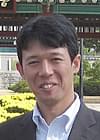 | | Dr. Satoshi Kojima graduated from the University of Tokyo with a Master of Engineering. After engaging in water and environment related official development assistance (ODA) projects in several countries including Indonesia and Hungary, he studied environmental economics at the University of York in the United Kingdom. After receiving a Ph.D. of Environmental Economics, he joined IGES in 2005 and has engaged mainly in quantitative policy analysis of sustainable development policy in East Asia. He published a book “Sustainable Development in Water-stressed Developing Countries: A Quantitative Policy Analysis” from Edward Elgar Publishing in 2007. | |
Kimihiko Hyakumura, Policy Researcher, Natural Resources Management Group, IGES | 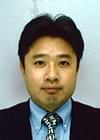 | |
|  | |  | | |  Transitioning to Sustainable Consumption and Production: Opportunities for Asian prosperity on a finite planet Transitioning to Sustainable Consumption and Production: Opportunities for Asian prosperity on a finite planet | | | | Anthony Chiu, President, Asia Pacific Round Table for Sustainable Consumption and Production |  | | Professor Anthony SF Chiu is professor of industrial engineering at De La Salle University. From 1998 to present, he has served as international expert and consultant to UN agencies in the field of industrial ecology (IndEco), sustainable consumption and production (SCP), and resource efficiency and cleaner production (RECP). Professor Chiu led the writing of several Asia Pacific (AP) studies for UNEP/UNIDO/UNESCAP including the AP Industry Paper as input to Rio+10 in 2002, AP SCP Paper to CSD18/19, and the RECP regional review. While in academe, he also serves the Philippine government as the Board Member of the National Pollution Adjudication Board, an entity equivalent to the Regional Trial Court for air, water, and pollution cases nationwide. He currently chairs three major regional organizations in technological dimension at AP Industrial Engineering and Management Society (APIEMS), in business management model at AP Business Innovation and Technology Management (APBITM), and in multi-stakeholder policy forum at AP Roundtable for SCP (APRSCP). | | | | Maria Jolanta Welfens, Project Coordinator, Wuppertal Institute for Climate, Environment and Energy |  | | Dr Maria Jolanta Welfens is currently project coordinator in the research group Sustainable Production and Consumption at the Wuppertal Institute for Climate, Environment and Energy in Germany. She is responsible for projects focussing on transition of consumption and production patterns towards sustainability and on education and communication. Over the last 17 years she led several projects addressing environmental modernization in Eastern Europe, cross-cutting issues such as ecological rucksack of goods and services, drivers of consumption in OECD, LivingLabs for sustainability. She worked on the concept of ecological rucksack together with professors Schmidt-Bleek and von Weizsacker (both were awarded the TakedaWorld Environment Award in 2001). She is a member of the Advisory Board of the Institute for Sustainable Development in Warsaw and member of the Round Table “UN-Decade for Education for Sustainability” in Germany. Her research interests are in the area of concepts, strategies and measures for sustainable consumption and production. | |
Kohmei Halada, Managing Director, National Institute for Materials Science (NIMS) |  | | Dr. Kohmei Halada graduated with a doctor degree of engineering (metallurgy) from the University of Tokyo at 1979. He joined NRIM (National Research Institute for Metals), which was former NIMS at 1980. He contributed establishment of the research field of ecomaterials, and starting up of LCA in Japan. He held successively director-general of ecomaterial center and managing director of innovative materials engineering laboratory in NIMS from 2001. Since 2009, he has been the charge of principal of center for strategic natural resource. Recently, he makes remarks and works on the sustainable resource use, namely alternatives, efficient use, and circulation, with publishing “forecasting the metal consumption till 2050”, “estimation of the potential of urban mining in Japan”. | |
Patrick Schroeder, International Advisor, China Association for NGO Cooperation (CANGO) |  | | Patrick Schroeder is based in Beijing as international advisor at the China Association for NGO Cooperation (CANGO) where he supports the coordination and international communication of the China Civil Climate Action Network (CCAN). This position is part of German-Chinese development and climate change cooperation, facilitated through the GTZ - Centre for International Migration and Development (CIM). He previously worked as consultant for the UNEP/Wuppertal Institute Collaborating Centre on SCP (CSCP) in Germany and supported the SWITCH Asia Network Facility through research on SCP in Asia and in their project implementation in China. Patrick is also about to complete his PhD thesis on the topic of environmental leapfrogging in China's energy sector. | | Satoshi Kojima, Director, Economy and Environment Group, IGES | | | | Magnus Bengtsson, Director, Sustainable Consumption and Production Group, IGES | | | | | | | |  Coping Strategies for Groundwater Under Threat Coping Strategies for Groundwater Under Threat | | | | Akio Morishima, Special Research Advisor, IGES | 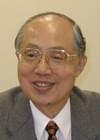 | | Prof. Akio Morishima graduated from the University of Tokyo School of Law and the Harvard Law School and is the former president of the Central Environmental Council, Japan.
He served as professor at Nagoya University and Sophia University, Japan. Since 1993 he has also been involved in the Central Environment Council of Japan as the Chairman of the Policy Planning Committee, and he served as President of the Council from 2000 to 2005. For nine years from 1998, he served as the first Chair of the Board of Directors at IGES. He is currently serving as the Special Research Advisor for IGES and the Chair of the Board of Directors of the Japan Climate Policy Center. | | | | Chayawee Wangcharoenrung, Environmental Officer, Water Quality Management Bureau, Pollution Control Department, Thailand | 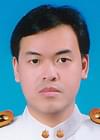 | | |
Jianqing Yang, Deputy Director, Center for Groundwater Monitoring of Ministry of Water Resources of China |  | Majored in Hydrology in Hohai University in China, where the bachelor degree was honored in 1994. Undertaking Research Studies in the University College Dublin (National University of Ireland) where, the Ph.D degree was awarded in early year 2005.
Since 1994, mostly involved in the management of hydrology and water resources monitoring and assessment in Department of Hydrology of Ministry of Water Resource of China. Recently, engaged in the management of Groundwater Monitoring Center of Ministry of Water Resources, under the umbrella of Bureau of Hydrology. As the deputy director of the Centre for Groundwater Monitoring, responsible for State groundwater monitoring network development project, soil moisture/drought monitoring planning, pilot projects of climate change effect on groundwater through monitoring, analysis and forecasting. Member of subcommittee (on Groundwater) of the technical committee of International Standard Organization (ISO-TC113-SC8). | |
Tomochika Tokunaga, Associate Professor, Department of Environment Systems, School of Frontier Sciences, University of Tokyo (as a representative of the Japanese Association of Groundwater Hydrology) | 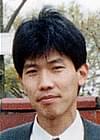 | | Dr. Tomochika Tokunaga is currently an Associate Professor at Department of Environment Systems, School of Frontier Science in University of Tokyo, Japan. He earned a master's degree in geology and a Ph.D in applied earth sciences from the University of Tokyo. He worked as a research associate in the Department of Geosystem Engineering, the University of Tokyo, and also as a visiting researcher in Department of Geology and Geophysics at the University of Wisconsin-Madison. He then became an Associate Professor at Department of Geosystem Engineering, School of Engineering in University of Tokyo before he was appointed the current position. His research focus has been to understand and predict the change of geosphere environment caused by human activities and also to develop necessary engineering measures to attain sustainable use of geosphere environment. He serves as a member of the Board of Directors of the Japanese Association of Groundwater Hydrology, and the Editor-in-Chief of the Journal of Groundwater Hydrology. | |
Devesh Sharma, Assistant Professor, TERI Univeristy | 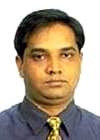 | | Dr. Devesh Sharma obtained his Doctor of Engineering Degree in Integrated Water Resources Management from the Asian Institute of Technology, Bangkok in 2007 and working as Assistant Professor in Department of Natural Resource Management at TERI University, New Delhi. Before joining TERI University, he was involved in CPWF-IWMI Basin Focal Project for Indus-Gangetic Basin. His research interests include integrated water resources management, climate change and water resources, water resources systems. He has published his research work in various national/international Journals. He has also been involved in various sponsored and consultancy projects related to various issues in water and agriculture sectors such as soil and water conservation, integrated water resources management, groundwater management, water productivity and livelihood enhancement, climate change and water resources. | |
Yatsuka Kataoka, Director, Freshwater Sub-group, IGES | | | | | | | |  The Challenges and Opportunities for Improving Corporate Environmental Management in Developing Asia The Challenges and Opportunities for Improving Corporate Environmental Management in Developing Asia | | | | Masanobu Ishikawa, Professor, Graduate school of Economics (Ph.D), Kobe University |  | | Professor Ishikawa had graduated and been given a Doctor of Engineering from Tokyo University and has been working as a professor of environmental economics in Graduate School of Economics, Kobe University since 2003. He has been working as an expert of waste management, LCA, packaging and climate change in number of councils of Government for around 30 years.
He had been the president of the Society for Packaging Science and Technology, Japan, has been a board member of directors in the Society for Environmental Economics and Policy Studies since 2010, and working as a councilor of Japan Containers and Packaging Recycling Association since its foundation.
He had organized various international conferences such as International Packaging Seminar and International Conference on Eco-efficiency. In 2006, he established a NPO: Gomi-jp which aims to reduce waste through social re-design and conducted a large scale social experiment in Kobe since 2007. | | | | Lei Shi, Associate Professor, Department of Environmental Science and Engineering, Tsinghua University, China | 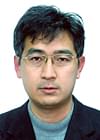 | | Dr. SHI Lei is associate professor of the Department of Environmental Science and Engineering, Tsinghua University. His research interests include industrial symbiosis, substance flow analysis and complex systems theory and approaches to industrial ecology. Dr. Shi has lead more than 20 projects on eco-industrial parks and circular economy, including Yixing, Ningbo and Fuzhou EIP projects. He is the member of the standing committee of Chinese Society of Industrial Ecology and Technology, and participated in the development of China Circular Economy Promotion Law. He is also actively participation in the International Society of Industrial Ecology. He was co-chair of the 5th Conference of the International Society for Industrial Ecology and organized Asia-Pacific Workshops on Industrial Ecology. | |
Prosanto Pal, Senior Fellow, Industrial Energy Efficiency Division, The Energy and Resources Institute (TERI), India |  | Prosanto Pal is a Senior Fellow in the Industrial Energy Efficiency Division at TERI (The Energy and Resources Institute) in New Delhi. The division undertakes research projects on energy efficiency improvement and cleaner technologies promotion among industries.
Mr. Pal has been involved in cleaner production studies; RDD&D (Research, Development, Demonstration and Diffusion) of energy efficient technologies among SMEs and studies on issues related to technology transfer from developed to developing countries. He leads several multidisciplinary research projects in these fields and has published numerous articles in international and national journals. He has authored a book on cleaner technologies in the foundry industry.
Mr. Pal has been educated in India and the UK: Bachelor of Technology from Indian Institute of Technology (Delhi) in Chemical Engineering; Master's of Science from University of Warwick (Coventry) in Manufacturing Systems Engineering and Master's Degree from University of Strathclyde (Glasgow) in Process Engineering. | |
Suehiro Hanada, Manager of Industrial Policy Division, Office for Environmental Model City Promotion, City of Kitakyushu | | | Born in 1958. After Waseda University law department graduation, carrier pass in media service; I was start working in Kitakyushu City in 1988.
Via the Trade Promotion section, the International Economic Promotion section, the International Exchange section, the Industrial Policy section; and Environment Industrial Policy manager of Office for Environmental Model City Promotion from April, 2010.
In addition, from 2003 to 2006; implement of JICA seminars as a course leader in the group training of “Environment and Development” others and in the country trainings such as Cambodia. | |
Xianbing Liu, Senior Policy Researcher, IGES Kansai Research Centre |  | Xianbing LIU is currently a senior policy researcher at Kansai Research Centre, Institute for Global Environmental Strategies (KRC/IGES). His research interest is firm's environmental behaviors and strategies for enhancing corporate environmental performances. He has tenth of publications in internationally distinguished journals like Journal of Environmental Management, Journal of Cleaner Production, Sustainable Development and Energy Policy, etc.
He once worked for China State Environmental Protection Administration (SEPA, now the Chinese Ministry of Environmental Protection) for about 7 years and has experiences in developing environmental policies. He achieved a master degree of environmental engineering from Tianjin University of China in 1997 and a Ph.D from Okayama University of Japan in 2007. | |
Yuki Shiga, Researcher, IGES Kansai Research Centre |  | | Mr. Yuki Shiga graduated with a Bachelor's degree from the Department of Environmental Information at Keio University and further received a M.S. from the Fenner School of Environment and Society, Australian National University. Since he joined IGES KRC (Kansai Research Centre) in 2009, he has been involved in various research projects, including corporate environmental management and technology transfer between India and Japan. | | | | | |  Can Biofuels Contribute to Building a Sustainable Society? Can Biofuels Contribute to Building a Sustainable Society? | | | | Kazuhiko Takeuchi, Vice Rector, United Nations University (UNU) ; Deputy Executive Director, Integrated Research System for Sustainability Science (IR3S), University of Tokyo |  | | Dr. Kazuhiko Takeuchi is the Professor of Graduate School of Agricultural and Life Sciences at the University of Tokyo. He is the Deputy Executive Director of the Integrated Research System for Sustainability Science , which was launched in 2005 as a research alliance, comprising of eleven Japanese universities/institutes, for establishment of the newly emerging discipline, sustainability science. Prof. Takeuchi took his posts as Vice-Rector of the United Nations University from 1 July 2008 and as Director of newly established United Nations University Institute for Sustainability and Peace from January 2009. His research focuses on creating eco-friendly environments for a harmonious coexistence of man and nature, both on local and global scales. He is the Editor-in-Chief of the journal “Sustainability Science” published by Springer. | | | | Zakri Abdul Hamid, Director of the Centre for Global Sustainability Studies at Universiti Sains Malaysia ; Science Advisor to the Government of Malaysia | | | | | Hirotaka Matsuda, Project Lecturer/Ph.D, Transdisciplinary Initiative for Global Sustainability (TIGS), Integrated Research System for Sustainability Science (IR3S), University of Tokyo | 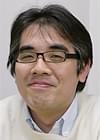 | | Dr. Hirotaka Matsuda was graduated from Graduate School of Agriculture, Hokkaido University. He worked at in Hokkaido Development Engineering Center as a researcher in 2005. He took up his current position in 2009 after being served as project associate of IR3S/TIGS, the University of Toyo from 2006 to 2009. His research interests are international food demand and supply, agricultural research and development and the relationship between economic development and nutritional situation. | |
Osamu Saito, Assistant Professor, Waseda Institute for Advanced Study, Waseda University |  | | Osamu Saito focuses on ecosystem services management, with particular interest in the interlinkages between ecological, human and social systems. His experience includes socio-ecological studies on the ecosystem services provided by agricultural rural landscape (Satoyama) in both Japan, scenarios making for sustainable biomass use in the Mekong Delta, Vietnam, and assessment of environmental and social impacts by vegetable oil crop production in Malaysia. | |
Masahiro Matsuura, Associate Professor, Graduate School of Public Policy, University of Tokyo | 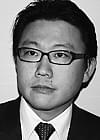 | | Masahiro Matsuura, Ph.D. is associate professor of ocean policy at the GraduateSchool of Public Policy at the University of Tokyo.? He received the doctoraldegree in urban and regional planning from Massachusetts Institute of Technologyin 2006. He has published multiple books on negotiation and consensus building,including Localizing Public Dispute Resolution in Japan (VDM-Verlag, 2005). | |
Mark Elder, Principal Researcher and Director, Governance and Capacity Group, IGES |  | | He has been leading research projects on envirnomental governance, biofuels, economic integration and environment, transboundary air pollution, and local initiatives. Other research interests include renewable energy and waste/recycling. He received a Ph.D. in political science from the Department of Government, Harvard University. He joined IGES from September 2006. | | | | | |  Harnessing Biodiversity: Strategic policies and concerted actions Harnessing Biodiversity: Strategic policies and concerted actions | | | | Charmine Koda, Jounarist | | | | | Tsunao Watanabe, Ministry of the Environment, Japan |  | | Tsunao Watanabe: Deputy Director-general of the Nature Conservation Bureau, Ministry of the Environment. Mr. Watanabe graduated from the faculty of Agriculture, University of Tokyo in 1978. Before taking his current post in July 2009, he held various posts such as Director of Nature Protection Division, Nagasaki Prefecture, Director of East Hokkaido Regional Nature Conservation Office, Director of Biodiversity Policy Division. | | Zakri Abdul Hamid, Director of the Centre for Global Sustainability Studies at Universiti Sains Malaysia and Science Advisor to the Government of Malaysia | | | | Kazuhiko Takeuchi, Vice Rector, United Nations University (UNU) ; Deputy Executive Director, Integrated Research System for Sustainability Science (IR3S) | | | | Masanori Kobayashi, Senior Coordinator, Programme Management Office, IGES |  | | Mr. Masanori Kobayashi is Senior Coordinator and Principal Researcher, Programme Management Office of the Institute for Global Environmental Strategy (IGES) in Hayama, Japan. Mr. Kobayashi joined IGES in 2004 and has been supporting a number of international and regional networks on sustainability issues and facilitating policy dialogues, pilot field activities, good practice analysis and strategic research particularly for Asia and the Pacific. Current research focus is on policy and field action interface, stakeholder participation and environmental information access. Formerly, he worked for the Secretariat of the United Nations Convention to Combat Desertification (1997-2004), United Nations Division for Sustainable Development (1995-1997), and the Japanese Ministry of Foreign Affairs as a specialized researcher at the Permanent Mission of Japan to the United Nations in New York (1992-1995). He holds LL.M (Master in Law) and M.A. in international laws and public administration. |
|
|